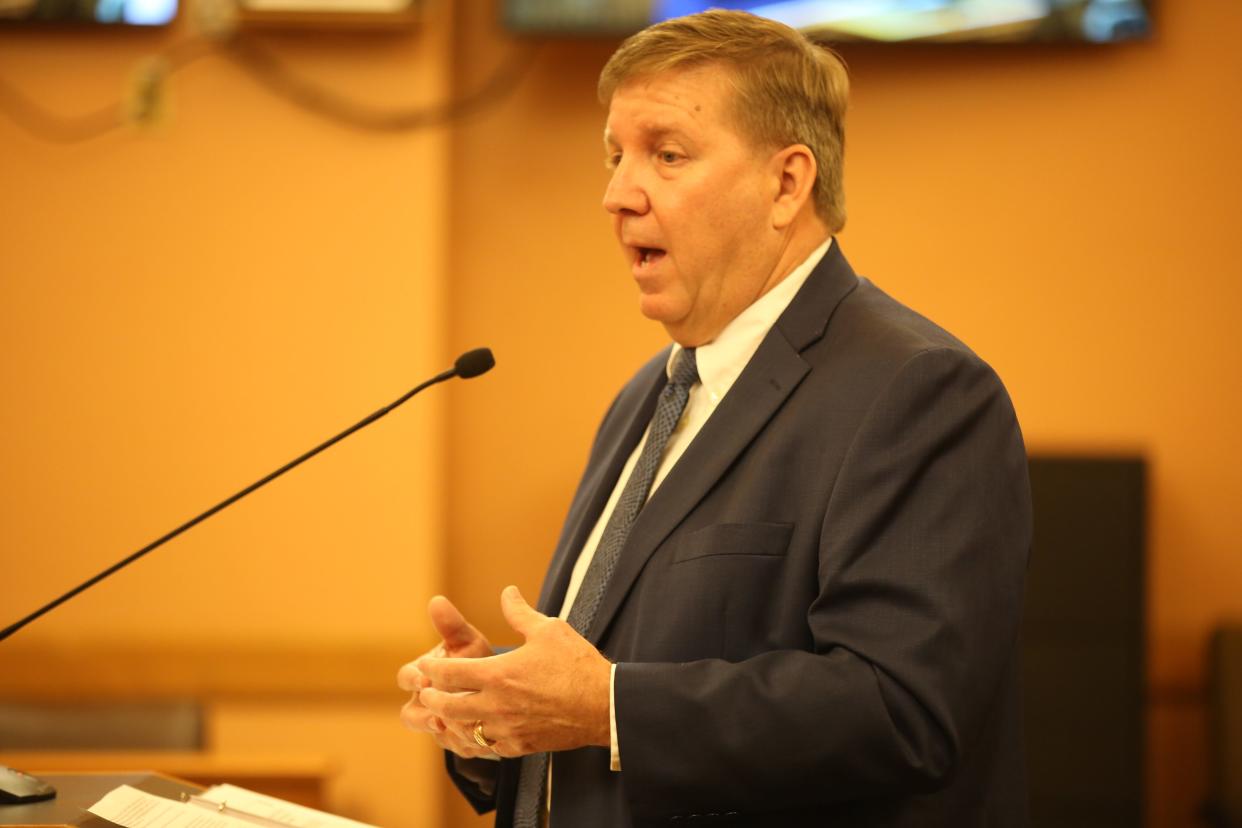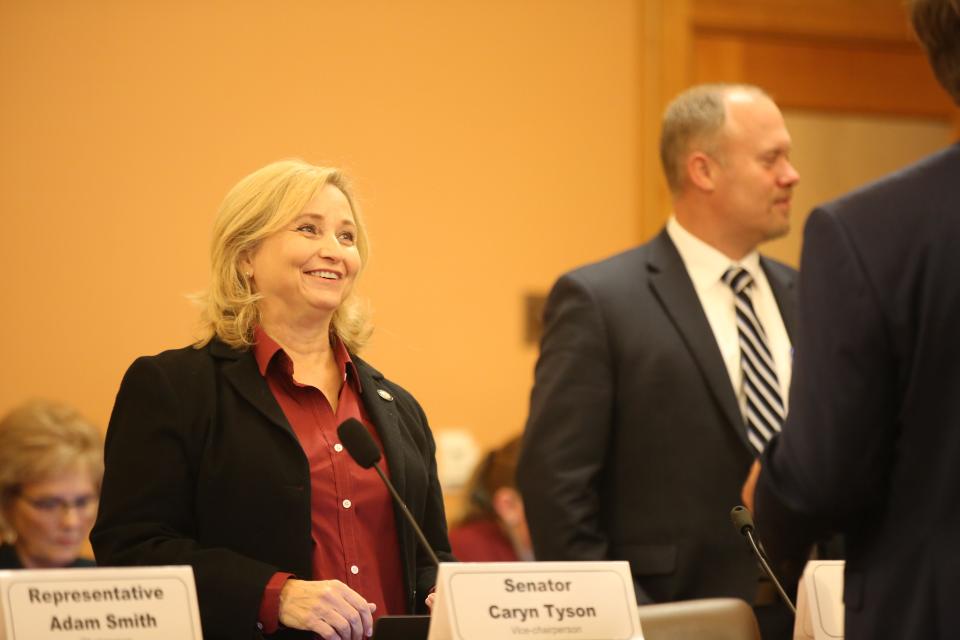Designed to lessen burden of sales tax collection, interstate pact faces scrutiny in Kansas

After previously floating the idea of pulling Kansas out of an interstate sales tax pact, top Republican lawmakers are calling for a deeper dive into the agreement.
Kansas is one of two dozen states in the Streamlined Sales and Use Tax Agreement, intended to simplify and modernize sales and use tax administration to reduce the burden of compliance.
"We have to balance state sovereignty with simplification and uniformity," Craig Johnson, executive director for the pact's government board, said at a committee hearing Monday. "We don't want to tell you what to tax and what not to tax. We want to do it in a manner so that sellers operating in multiple states, they at least have a good chance of voluntarily complying because that's what they're trying to do. And then use technology wherever we can to try to make it easier."
But some legislators have been frustrated with that balance. They argue that the Legislature should not give up legislative authority over tax policy to Streamlined, which sets definitions for tax purposes, among other nuances of the tax code.
Meanwhile, officials say that ceded authority comes is a tradeoff to bring in substantial revenue to state coffers while reducing compliance costs for businesses.
"The department is very much in favor of maintaining its membership in Streamlined, we think the state gets a tremendous benefit from that," said Kansas Department of Revenue Secretary Mark Burghart.
Kansas is collecting tens of millions of dollars every year through the agreement, at the cost of an annual fee of tens of thousands, plus a compensation for third party services of a couple million.
Kansas has been involved with the group since its formation in 2000, but some Republican legislators — including Sen. Caryn Tyson, R-Parker and chair of the Senate tax committee — suggested last session that it may be time to end the state's involvement.
Since then, the merits of the agreement have grown on her, though she still has reservations.
"I think we need to take a deeper dive on it," Tyson said after a Monday meeting of the Special Committee on Taxation. "They brought up a lot of good possibilities. I know the businesses, I've talked to a few of them, they really like the idea of what Streamlined is doing. I just have always had concerns of a federal or another entity having legislative authority."
Balancing state sovereignty concerns
Johnson said his group must strike a balance between simplifying tax laws for businesses and government while maintaining state sovereignty.
"How do you balance simplification and uniformity with state sovereignty?" Johnson said. "Every time you require something, doesn't that take away a little bit of that sovereignty? But if you don't require certain things to be uniform, then all of a sudden you increase the complexity. So where do you find that balance? That's extremely important.
"We are not about telling you what to tax and what not to tax. A lot of what we do is from an administrative perspective and creating uniformity in the administrative processes and procedures. We believe that it is the state legislatures that need to decide what to tax and what not to tax. We will talk about uniform definitions, and we will ask you to either tax everything in that definition, or exempt it. But at least what falls within the definition in Kansas falls within that same definition in every one of the other member states."
Rather than pull Kansas out of Streamlined, top lawmakers want to scrutinize the current balance.
"I think we need to take a closer look on the balance," Tyson said, "and make sure it's where it needs to be for Kansas."
"They are willing to listen and work with us, so that's a good thing," she said.
Tyson is urging her colleagues to specify how the state's trio of delegates to Streamlined exercise their shared, singular vote. She is one of the delegates.
"If we get the voting member figured out, I think that will help," she said.

Sen. Virgil Peck, R-Havana and Tyson's vice chair, said efforts to enact a back to school sales tax holiday have been stymied by the Streamlined definitions of school supplies. Peck indicated he favors a definition that would differ from the pact.
Johnson acknowledged that Streamlined definitions can create "oddities," but they also create clarity and certainty for businesses so they don't have to fear that tax collectors have different interpretations of subjective terms. He cited how the group differentiates between food and candy, which was a sticking point during a debate over eliminating the state sales tax on food last year.
The distinction hinges on whether the product contains flour, meaning a Twix is not considered candy while a Snickers is.
Regardless of what Streamlined does, Kansas can choose to enact tax laws as it sees fit.
"Nothing in our agreement overrides your state laws," Johnson said. "So if there's anything that's inconsistent, your state law controls."
But such a situation could put Kansas out of compliance with tax policies agreed upon by the member states. That could make the state subject to sanctions, such as losing voting power over proposed amendments to the agreement.
"Streamlined doesn't legislate to us, but they hold our membership in threat," said Rep. Adam Smith, R-Weskan and chair of the House Tax Committee. "So if we need to make changes or propose amendments at the governing board level, let's have active participation to where we get in and get those things accomplished."
Tax collections boom under Streamlined
Streamlined was created "to deal with the issue of out-of-state retailers not being required to collect and remit compensating use tax on sales into the state of Kansas," Burghart said.
Such a system "is good for the state revenue departments but also very good for the business community," Burghart said.
"This type of system is designed to help, not only the states in terms of collecting taxes," Burghart said, "but also the business community in making their tax collection and remittance responsibilities less expensive. It's an operating expense for them and can be very significant."
Streamlined is a lucrative revenue stream for state coffers.
Kansas collected $68 million through Streamlined last calendar year, according to the Revenue Department. This year, the interstate tax pact is expected to bring in more than $80 million, Burghart said. That contributed to $775 million in compensating use tax collections in fiscal year 2022.
Kansas does pay a small fee — about $35,000 a year — to be in Streamlined. The state also paid nearly $2 million to certified service providers last year.
Certified service providers are third parties that handle tax out-of-state sales tax compliance for retailers using the Streamlined filing structure. Participating businesses are not liable for any mistakes and are not charged for the service.
Instead, the providers are paid roughly 5% of the tax revenue they bring in for the state.
Likewise, Kansas businesses that sell products to buyers in other Streamlined states benefit by having their compliance costs covered by the other state, as long as they use one of the providers.
Burghart said the providers benefit businesses — especially smaller and medium-sized operations — while also improving the accuracy of tax calculations and collections, as well as reducing the cost of state enforcement activities.
But Peck said Streamlined brought difficulties early on, recalling legislators losing elections in 2004 because of the burdens on small businesses.
"It is something that I have never been supportive of," Peck said of Streamlined. "However, I'm still listening with an open mind now because we are so far down the road and I can see some upside, still more downside."
Wayfair Supreme Court case instrumental in collecting out-of-state sales taxes
The tax revenue from out-of-state sales has boomed since the U.S. Supreme Court in 2018 overturned 50 years of its own precedent. The 5-4 decision in the case, which involved online furniture and home goods retailer Wayfair, held that states can generally require out-of-state businesses with no physical presence in the purchaser's state to collect sales taxes.
Previously, states were barred from compelling out-of-state retailers to collect taxes if that retailer had no physical presence in the purchaser's state. Burghart said that at the time of the original 1967 case and a follow up one in 1992, "the compliance burden was tremendous for businesses." Those cases helped inspire formation of Streamlined to establish a simpler system.
Streamlined also helps level the playing field for Kansas brick-and-mortar businesses facing competition from out-of-state companies shipping products into the state without having to collect sales tax, Johnson said.
"There's no doubt looking at the data that it's beneficial in Kansas, especially post-Wayfair," Smith said. "Look at the increase in the number of business registrations that are wanting to use the service providers to make it easier. I think there's a big benefit. But let's make sure that we've got people with a seat at the table to make sure that we're voicing our concerns with some of those definition requirements and some of the nuances."
Smith called continued membership in Streamlined a "cost versus benefit thing."
"We need to do a deep dive and make sure that we're we're looking at all the factors," Tyson said.
"To me, that's talking to the businesses," Smith said. "I want to get some businesses in front of us and say, how does this benefit your business? What are the pros? What are the cons?"
Johnson said the costs and benefits go beyond what the state pays compared to the tax revenue it brings in.
"There's a lot of impacts that you can't quantify in dollars and cents," he said.
This article originally appeared on Topeka Capital-Journal: Kansas membership in Streamlined sales tax agreement scrutinized

